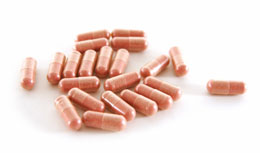Are cranberry pills beneficial for pregnant women? Yes they are, however, many women are slightly hesitant about taking these medicines because they are unsure about its side effects. Read this article to understand the link between cranberry pills and pregnancy.

Cranberries are good for your health for many different reasons. Cranberries are well-known for its antioxidant properties that help to keep the free radicals in the body in check. It also supplies high amount of vitamins A and C and minerals like calcium, phosphorus and magnesium. Its natural components are useful for treating various ailments. To obtain benefits from cranberry, it can be taken either in the form of juice or as capsules. Many women do not like to drink cranberry juice as it has a strong taste. A suitable alternative for cranberry juice is the cranberry pills. These pills contain dried form of cranberry powder. Let's go ahead and find out the connection between cranberry pills and pregnancy in terms of benefits and side effects.
Benefits
During pregnancy, women are susceptible to urinary tract infection (UTI). This is because of the growing size of the uterus. It puts an additional amount of pressure on the urinary bladder, which makes it difficult to drain out the urine from the bladder completely. As a result, infection causing bacteria get the scope to grow in numbers in the urine residue which is left behind. This leads to an infection in the urinary tract. Cranberry pills are found to be highly effective in fighting this infection. It reduces the inflammation of the urinary tract and provides relief from the pain associated with UTI. Moreover, it is good for prevention of the infection. This is possible because it contains proanthocyanidins, which do not let the bacteria sit on the bladder walls and grow there.
Side Effects
There are no such evidences that suggest that cranberry pills are not safe during pregnancy. However, the real problem that lies with cranberry pills is that it tends to interact with other prescription medicines and reduces their effects. Suppose, if you are taking antacids and cranberry pills together, then the antacids may not give the same kind of result as you may expect. It also interacts with other medicines like vitamin B12 supplements and blood thinner medicines like warfarin. It may not suit those pregnant women who have diabetes. This is because cranberries contain high amount of sugar that can raise their blood sugar level further. For all these reasons, it is always advisable to check with your doctor first before starting this natural supplement. Those people who are allergic towards cranberries, blueberries and benzoic acid should avoid cranberry pills. If they take the pills unknowingly, then they will get itchy allergic rashes and develop other allergic symptoms as well. Some minor side effects like diarrhea, fatigue, headache, dizziness, frequent urination, etc., are observed if you take this supplement in excess. If you experience any of them after starting cranberry pills, then you must report it to your doctor.
Dosage
One single pill of cranberry extract is almost equivalent to 7-10 glasses of cranberry juice. Thus, it gives quicker results as compared to cranberry juice. During the infection, the daily dosage of cranberry pills is one 400 mg pill to be taken two times a day. The first pill of the day should be taken in the morning, one hour before breakfast and the second one should be consumed in the evening, one hour before dinner time. It should be taken with plenty of water. To yield maximum benefits from this supplement, you must drink 6-8 glasses of water throughout the day. Suppose, if you have missed a dose of cranberry pill and have already taken your food, then you must wait for 2 hours before you take the pill. Once your infection is cured, continue with one single dose of 400 mg capsule for the prevention of recurrence of UTI.
However, before purchasing these pills, you must check the label carefully for its ingredients. Many brands of cranberry pills contain some other ingredients that are not suitable for you during pregnancy. Hence, be careful by choosing the right brand and following the prescribed dosage rather than putting yourself at any kind of risk while you are pregnant.






 Cranberries are good for your health for many different reasons. Cranberries are well-known for its antioxidant properties that help to keep the free radicals in the body in check. It also supplies high amount of vitamins A and C and minerals like calcium, phosphorus and magnesium. Its natural components are useful for treating various ailments. To obtain benefits from cranberry, it can be taken either in the form of juice or as capsules. Many women do not like to drink cranberry juice as it has a strong taste. A suitable alternative for cranberry juice is the cranberry pills. These pills contain dried form of cranberry powder. Let's go ahead and find out the connection between cranberry pills and pregnancy in terms of benefits and side effects.
Cranberries are good for your health for many different reasons. Cranberries are well-known for its antioxidant properties that help to keep the free radicals in the body in check. It also supplies high amount of vitamins A and C and minerals like calcium, phosphorus and magnesium. Its natural components are useful for treating various ailments. To obtain benefits from cranberry, it can be taken either in the form of juice or as capsules. Many women do not like to drink cranberry juice as it has a strong taste. A suitable alternative for cranberry juice is the cranberry pills. These pills contain dried form of cranberry powder. Let's go ahead and find out the connection between cranberry pills and pregnancy in terms of benefits and side effects.